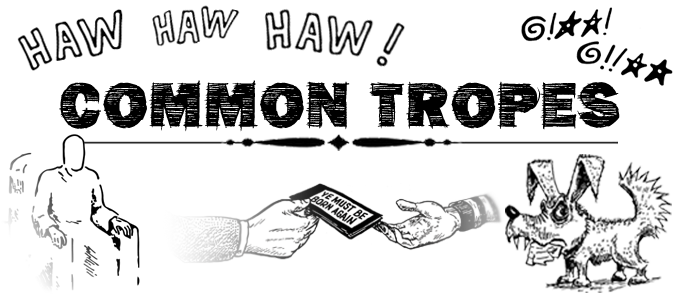
A trope is a storytelling device, a way for the author to describe situations that are assumed to be recognisable to the audience/readers. It is the use of figurative language for the purposes of artistic effect. There has been a semantic change in the defintion of trope to also describe commonly used literary/rhetoric devices or motifs within creative works.
Notably, tropes are different from cliches, and are neutral (i.e. not good or bad). They are meant as a tool to be used to convey and express the author's ideas to the audience, though they can be overused, particularly in the case of Chick media.
We have collected common examples as a way of recording the various common tropes used by Chick in his media and these are detailed below.
 Angelic Peripeteia ⇑ ⇓
Angelic Peripeteia ⇑ ⇓ 
While angels are stated in the Bible as ministering to believers of Christ and often provide spiritual aid on behalf of God during hardships, their depiction in Chick tracts goes beyond spiritual aid. Indeed, they encompass many of the functions that would be considered parallel to certain government entities in the world (such as protection of important persons and intelligence gathering/reconnaissance), and are capable of directly influencing events in Chick's universe. Examples of this include causing car tires to suddenly burst, commanding animals, physically tripping people, and manipulating circumstances in order to interfere with the plans of their fallen brethren (demons). It is arguably a combination of two main tropes in media - that of deus ex machina and divine intervention, as their presence is often directly related to the plot, and in cases where they physically intervene, a contrived way to resolve plot lines regarding hopeless situations.
 Assuming the Position ⇑ ⇓
Assuming the Position ⇑ ⇓ 
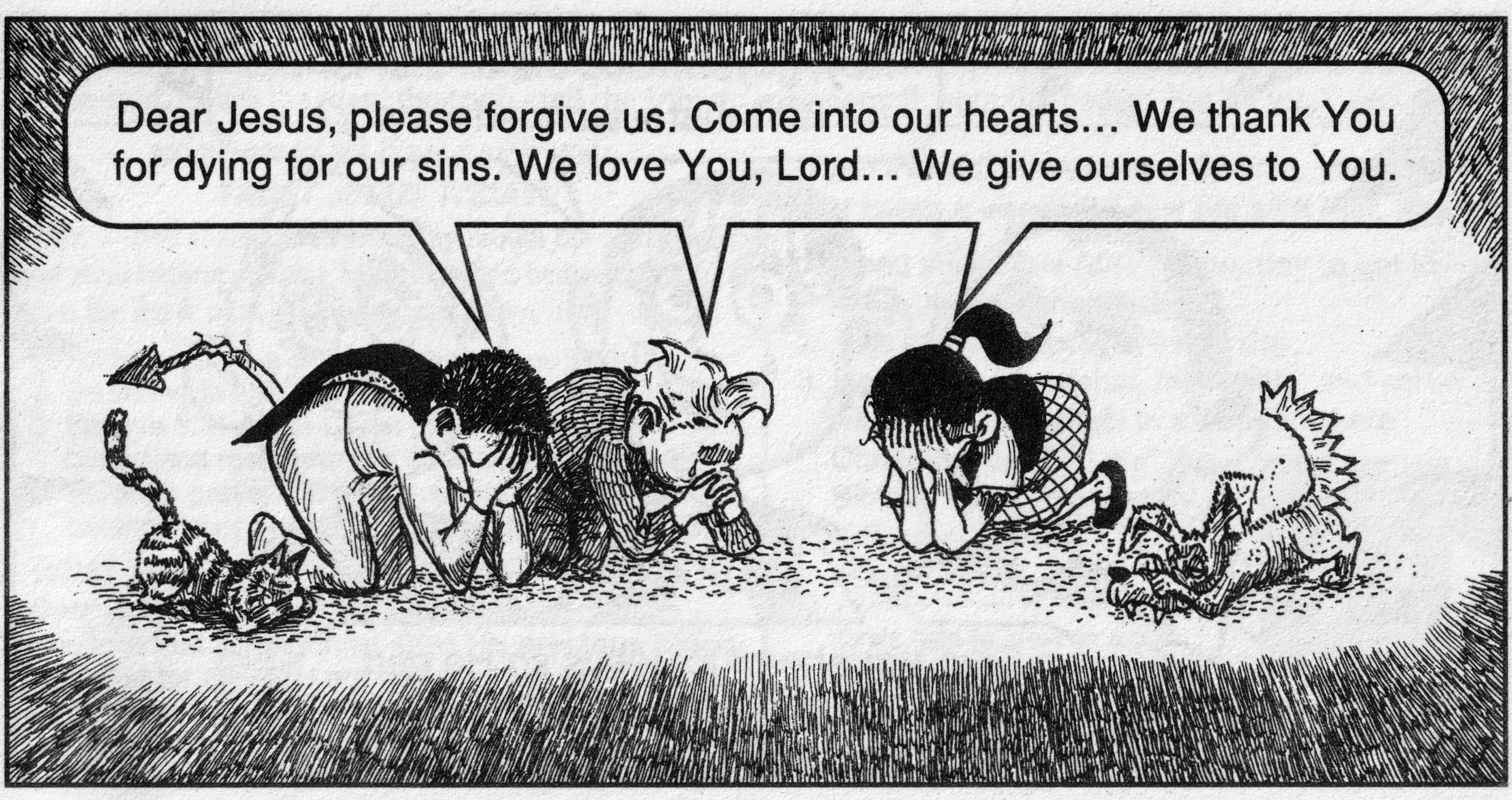 Three children, Fang and Goldie "assuming the position" from the tract The Little Ghost (#151)
Three children, Fang and Goldie "assuming the position" from the tract The Little Ghost (#151)
An integral component of the Evangelical conception of salvation is to honestly admit one's nature as a sinner and to entreat God to forgive your prior transgressions by reciting some variation of the Sinner's Prayer. While there is some disagreement between various Christian denominations (and even from believer to believer) as to whether this prayer needs to be spoken out loud or can merely be held in one's thoughts, there are few other iron-clad stipulations beyond the general gist of the basic sentiments of the text. While not universally the case, Chick's works often depict newly repentant sinners dropping to the ground on all fours and burying their faces in their hands as they recite the prayer audibly. This specific maneuver seems to have increased in frequency over the course of Chick's career and may have been adopted as a means of demonstrating a more "sincere" form of contrition on the part of the penitent.
Ironically, despite Chick's general animosity towards the competing religion of Islam, this particular position is not that dissimilar from the fourth configuration of the Muslim prayer practice (or Salah) known as Sujud or "prostration".
 The Devil's Birthday ⇑ ⇓
The Devil's Birthday ⇑ ⇓ 
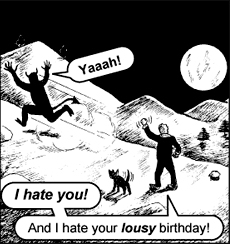 Joey hates the Devil's lousy birthday from the tract Boo! number 106)
Joey hates the Devil's lousy birthday from the tract Boo! number 106)
Much like members of many other conservative, evangelical Christian traditions, Jack Chick was an ardent opponent of the celebration of the Hallowe'en holiday (also known as All Hallow's Eve) historically celebrated in popular culture each year on October 31st. In addition to the negative connotations ascribed to the holiday by his own religious background, Chick received a number of embellishments through his collaborations with the controversial "ex-Satanist" John Todd. Chick seemed to believe that it was a somewhat popularly held concept in circles of the practitioners of witchcraft that Hallowe'en was sacred to them because it represented the Devil's Birthday, or the presumed date of the "birth" of the fallen angel Lucifer. However, Chick openly demonstrates how this particular conception does not fit into his own theology (see CHICK.106.1991 - "Boo!").
In actuality, the celebration of Hallowe'en began as a Christian festival, celebrated on the evening just prior to All Saints' Day and beginning the observance of the period known as Allhallowtide, the portion of the Christian Liturgical year in which the memories of the dead are remembered. The modern traditions typically associated with Hallowe'en, such as children dressing in costumes and roaming from door to door requesting candy or other treats gradually evolved from the similar historical practices known as "guising" and "souling" respectively. While the former is a Scottish / Irish tradition traditionally associated with the Hallowe'en season, the latter is a primarily English custom somewhat akin to Christmas caroling, which was generally performed in exchange for "soul cakes", a small round cake or shortbread biscuit. Needless to say, non-dualistic, nature-based religions such as Wicca and Neopaganism do not worship, believe in, or even possess a concept of an evil deity such as Satan/the Devil as most Christians do. The history of such pre-Christian traditions being maligned through association with a concept of evil they do not share has a long and sordid history in Christian tradition.
Remarkably enough, the "Devil's Birthday" (or "Fandens fødselsdag") is an actual colloquialism held in Denmark and Norway, but not for the 31st of October. The dates June 11 and December 11 took on this moniker in 1888 due to their history as due dates for loan and interest payments. This usage of the phrase is rather tongue-in-cheek and does not hold any subsequent religious connotations.
 Emphatic Formatting ⇑ ⇓
Emphatic Formatting ⇑ ⇓ 
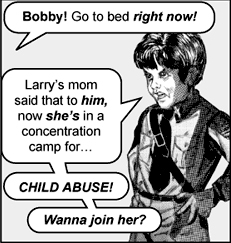 Bobby really means what he says, from the tract The Last Generation (#031)
Bobby really means what he says, from the tract The Last Generation (#031)A common means of highlighting certain portions of written text and conveying the emotions behind them is through the use of formatting conventions such as bold face, italics, CAPITALIZATION, underlining and the use of certain combinations of punctuation such as exclamation and question marks?!? However, in an attempt to punch up the sometimes EXTENSIVE dialog in his tracts and comics, Jack Chick sometimes had a habit of overusing these conventions or even combining them in unusual or confusing ways. While this may be something of a matter of subjective opinion, and while specific examples would be too numerous to list in their entirety, this phenomenon can be observed in nearly EVERY tract written by Chick and published by his company. While SUCH flamboyant formatting was less common and less egregious in his earliest hand-lettered works, it still appears in them nevertheless and can even be observed in his full-sized comic books and full-length paperback publications.
 Faceless God ⇑ ⇓
Faceless God ⇑ ⇓ 
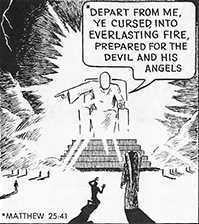 Old faceless condemns yet another sinner to the eternal pressure cooker in tract number 3A, This Was your Life!
Old faceless condemns yet another sinner to the eternal pressure cooker in tract number 3A, This Was your Life!Often depicted sitting on a Great White Throne, the faceless colossus that is God of Chick’s universe is depicted either allowing people to enter Heaven or ordering them to be cast into Hell and judging people for their acceptance or refusal of Jesus Christ, as per the Protestant concepts of sola fide (“faith alone”).
The decision for Chick to render God without a face can likely be attributed to fundamentalist practices and interpretations of Exodus 33:20 and John 1:18. The reluctance to depict the actual face of God may stem from the belief that it would be inherently blasphemous to do so, and ironically would (much as with the trope Assuming the Position), potentially mirror the aversion many modern Muslim's express for any artistic representation of the Islamic prophet Muhammad.
 Fang the Dog ⇑ ⇓
Fang the Dog ⇑ ⇓ 
-- See Fang the Dog page
 Frequent Names ⇑ ⇓
Frequent Names ⇑ ⇓ 
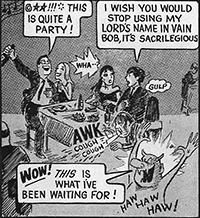 Bob greatly offends the unnamed protagonist of Tract #002, "A Demon's Nightmare", by taking the Lord's name in vain... we think.
Bob greatly offends the unnamed protagonist of Tract #002, "A Demon's Nightmare", by taking the Lord's name in vain... we think.Grawlixes (or obscenicons) are combinations of various typographical symbols or other unpronounceable characters intended to replace profanity, often as a way to get around censoring or language restrictions in publishing. While Chick was self-published, he may have decided to use these in his various tracts and comics, possibly as a residual from earlier times in his life where he drew works for distribution in newspapers (such as in the short lived, serialized comic he illustrated, Times Have Changed?).
The term "grawlix" can be attributed to the American cartoonist Mort Walker, who created the famous newspaper cartoons Beetle Bailey and Hi and Lois, in his 1964 article "Let's Get Down to Grawlixes".
 "HAW HAW" ⇑ ⇓
"HAW HAW" ⇑ ⇓ 
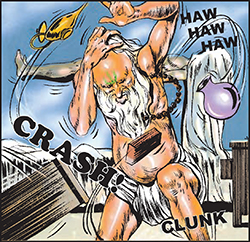 A posessed Santosh bombards the phony holy man, Geh neesch with his teleken esis. From Comic number 4, Exorcists
A posessed Santosh bombards the phony holy man, Geh neesch with his teleken esis. From Comic number 4, ExorcistsWhile typically an exclamation uttered by characters that Chick is intending to depict as villainous, in-universe, the laugh is meant to be a depiction of the unrepentant nature of the person who is laughing, seemingly not caring about where they spend eternity. The unintended consequence of Chick’s choice is a laugh that due to poor execution, removes drama and emotion from the scene whenever it appears.
 Homoerotic Overtones ⇑ ⇓
Homoerotic Overtones ⇑ ⇓ 
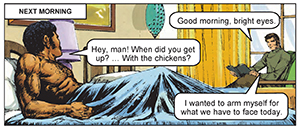 Tim and Jim had a really long night.
Tim and Jim had a really long night.
Frequently occurs within the Crusaders series of comics, where the duo (Timothy Emerson Clark and James Carter) are often depicted in situations or events that to the reader, may be suggestive that the duo are in a relationship that could be considered romatic or possibly even sexual. But as the idea of two males in a homosexual relationship, particularly those who are representative of fundamentalist Christians conflicts with both the author's and artist's beliefs (Jack Chick and Fred Carter respectively), this results in the dialog and events being heavily inconsistent with the in-universe beliefs of the characters/creator’s beliefs. Using the example image, the presented situation is quite unusual to occur between two characters that are supposedly heterosexual males, but is glaring in such a way that any sort of undertone involving the sexuality of the duo is replaced with an overtone of ambiguity as to whether they are in a pseudo-romantic relationship or are actual lovers.
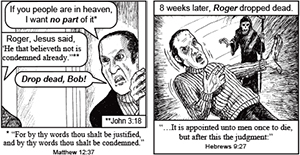 Roger gets whacked for rejecting Bob's offer in Caught, tract #160.
Roger gets whacked for rejecting Bob's offer in Caught, tract #160.
A frequent occurrence in Chick media is how characters who reject Jesus are usually killed off in short order, either suddenly or by seemingly improbable and contrived means, irrespective of whether they were pleasant individuals or not. Likewise, characters who accept Jesus die almost immediately after doing so, irrespective of how they may have previously lived their lives.
This has the unintended message that God (in Chick’s universe) will send good people to Hell if they do not expressly accept a very specific set of Independent Baptist teachings, and that people who unapologetically live their entire lives in a manner that is destructive to themselves and others do not get any punishment or consequences if they accept Jesus by saying the correct words immediately prior to their deaths.
The trope name is a combination of several aspects - the combination of the speedy, accurate and often extreme ways that such characters are killed off, under the seeming context of 'karma' within Chick's universe (acceptance or rejectance of Chick's version of Christianity). It is also derived from the name given to an orbital kinetic bombardment weapons platform mentioned in a 2003 United States Air Force report (aka "Rods from God"), named due to the speed at which tungsten rods would theoretically be deployed at targets and the difficulties associated with defending against such a weapon.
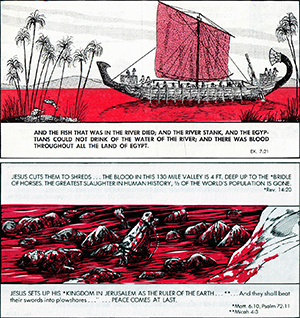 Nuthin' but the blood...
Nuthin' but the blood...
Over many decades, Chick Publications has managed to polish the process of printing miniature cartoon books to a mirror shine allowing them to produce millions upon millions of these little sermonettes at a ridiculously cheap price. One of the primary ways they have managed to accomplish this is by standardizing both the dimensions and composition of their booklets which allows their manufacturing process to be significantly streamlined. Nearly all Chick tracts are composed of 22 interior pages (typically printed in black and white) with a one-color front and back cover. The specific color used varies from tract to tract, but generally tends to favor bright primary colors, likely to better draw attention to the comics when they are distributed (or more commonly discarded) in the wild. However, this formula is sometimes broken as in the earlier days of the company extra effort would sometimes be taken to also include a splash of the cover's color on some of the interior pages of the tract as well. More frequently than not, this was a deep- to middle-red employed to depict either the rich color of blood (either that of Jesus or of his unfortunate victims) or the foul skin of the Devil or another demonic entity. A process such as this obviously adds additional effort and expense to the printing process, and so has only been utilized a handful of times in entries found in their back catalog, including the following:
- #006A - Somebody Goofed - The ironically named "Friend" removes his human mask to reveal his bright red demon face. (006A.1972B.22)
- #015 - Big Daddy - The proto-version of Fred Carter's rendition derived from Zallinger's illustration The March of Progress appears in Chick Yellow in the centerfold. (015.1972A.12 & 13)
- #028 - One Way! - The red blood of Jesus drips from his wounds on the cross onto two children praying for salvation while Assuming the Position. (028A.2002.17A)
- #029 - The Passover Plot - The Nile river is shown running red with blood as a result of the first plague of Moses. (029.1972.05). The bowl containing the blood of a lamb for marking the doors of the Jewish people so they are spared from the death of their firstborn sons. (029.1972.13), (029.1972.14) and (029.1972.22). Jesus is shown bleeding on the cross during the Crucifixion. (029.1972.18) and (029.1972.22)
- #035 - Kings of the East (Discontinued) - The Valley of Meggido is depicted as a river of red blood in the aftermath of the slaughter of the armies of the Anti-Christ and their mounts follow the Battle of Armageddon. (035.1975.18)
- #073 - Angels? - Mr. Lou Siffer's beet red demonic visage is revealed once he is rebuked by Tom and forced to flee. (073.1986A.21)
- #091 - That Old Devil (Discontinued) - A robed, hooded Satan with red eyes says that getting to heaven is about 'good deeds outweighing your bad deeds'. (091.1989.16B)
 "Love Gift" ⇑ ⇓
"Love Gift" ⇑ ⇓ 
In-universe, this is representative of the gift that Jesus died for your sins. Characters will often exclaim about either receiving or rejecting the "Love Gift" of Jesus Christ. This is indicative of a cornerstone of Chick's theology, namely the concept of Sola Fide (“faith alone”) which rejects a works-based system of salvation and instead places the sole arbiter of an individual's eternal fate in to the binary choice of whether or not they placed their faith in the Christian's conceptualization of a savior. It should be noted, that this is not a universally held belief among all adherents to Christianity, and there are individuals with equally fervent beliefs that claim that Chick's insistence on the additional stipulation that sinners must be willing to turn from their sin (an idea referred to as "Lordship Salvation") is gravely dangerous and needlessly results in the rejection of the Gospel by those unwilling to do so.
 The Mother Goddess / The Queen of Heaven ⇑ ⇓
The Mother Goddess / The Queen of Heaven ⇑ ⇓ 
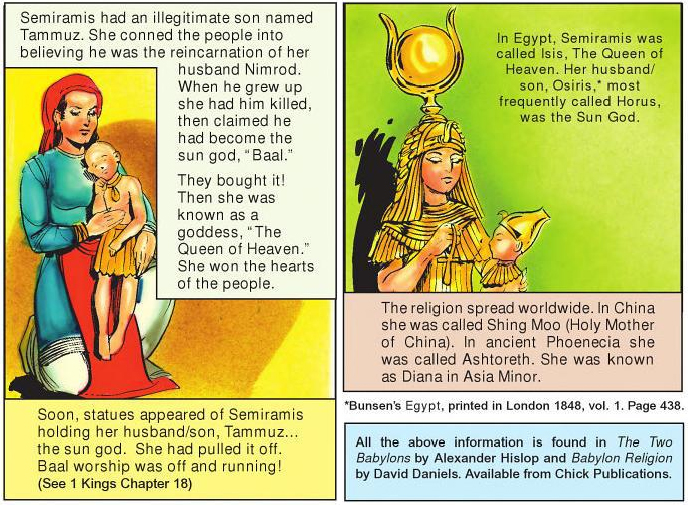 For a goddess, she certainly had herself an impressive number of aliases, from Comic number 12, Sabotage?
For a goddess, she certainly had herself an impressive number of aliases, from Comic number 12, Sabotage?Intended to be a slight against The Virgin Mary and veneration of her (of which Chick is against). Fundamentalist Christians tend to place little importance on Mary, and in universe, Chick often uses titles such as ‘Mother Goddess’ and ‘Queen of Heaven’ when referring to Mary. This is also applicable to cases where Chick is referring to female deities (such as Ishtar), but notably, these are often combined into Chick’s depiction of Mary.
 One Big Party ⇑ ⇓
One Big Party ⇑ ⇓ 
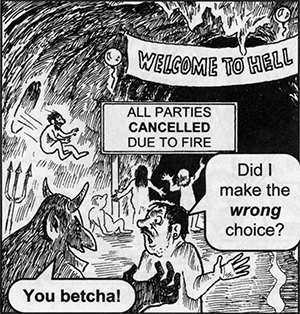 Damned souls learn Hell isn't all it was made out to be. In Tract #188, The Missing Day
Damned souls learn Hell isn't all it was made out to be. In Tract #188, The Missing DayOftentimes in tracts, characters will be dismissive of the idea of going to hell, saying that it'll be "one big party" or that all their friends are gonna be there. To Chick, who believed there to be no upsides whatsoever to being in hell, this was a clear sign that people weren't taking his notions of the afterlife seriously, and he makes the point to address this as often as possible, whether by having a preacher debunk the notion or by having a character go to hell themselves and find out how wrong they were.
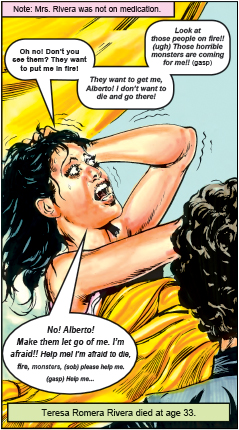 Teresa Rivera sees demons coming to drag her to hell. In Comic C13, Alberto.
Teresa Rivera sees demons coming to drag her to hell. In Comic C13, Alberto.Teresa Rivera sees demons coming to drag her to hell. In Comic C13, Alberto.
When characters approach death in Chick tracts, the barriers between earth and the afterlife can sometimes become a little flimsy. Sometimes a character will see Jesus or an angel coming to meet them before they die. Sometimes they will scream about demons coming to take them away or claim they can already feel the sting of hellfire. A character may experience one followed by the other as the experience convinces them to make a quick death bed repentance. Sometimes even bystanders will report the smell of rotten eggs, like the burning sulfur of hell briefly crossed into our world.
This is different from instances of characters being influenced or possessed by angels and demons, as in those cases they don't usually realize consciously what's going on and therefore would more accurately be classified as Angelic / Demonic Peripeteia.
This is often done to tie in with the real-life notion of Near Death Experiences, where people on the brink of death will report having left their body, or traveled towards a light, or experienced some form of afterlife, good or bad. It possibly also ties in with anecdotal reports of believers dying more peacefully than nonbelievers.
 Salvation Make-Over ⇑ ⇓
Salvation Make-Over ⇑ ⇓ 
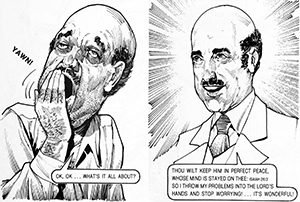 Frank Miller cleans up quite well. From comic number 11, The Truth About The Marriage Mess
Frank Miller cleans up quite well. From comic number 11, The Truth About The Marriage MessIn Chick’s universe, those who do not believe in Christ and are considered “evil” by the narrative are drawn to be purposefully hideous and overweight, with features exaggerated to levels common in caricatures. But once the characters have accepted Christ, they undergo immediate changes. This often results in the character becoming slimmer, and features altered to be more in line with ‘realistic’ depictions of people.
 Seven Letter "Saviour" ⇑ ⇓
Seven Letter "Saviour" ⇑ ⇓ 
A point of contention among those who believe that the King James Version (KJV) is the “only True Bible” and the spellings of the word ‘Saviour’. Proponents of this (of which Jack Chick was one) believe that spellings of ‘Savior’ rather than ‘Saviour’ are corruptions of the Word of God and are therefore false. This renders other Bible translations (such as the New International Version) inferior to the KJV, despite the translation errors present within KJV itself, as well as the more archaic English language used (such as Ye, thee and thou). Notably, the spelling of ‘Savior’ and ‘Saviour’ make little actual difference when referring to writing, as it is a result of the differences in spelling between British English and American English (for example, colour and color respectively).
 Sinner Slinging ⇑ ⇓
Sinner Slinging ⇑ ⇓ 
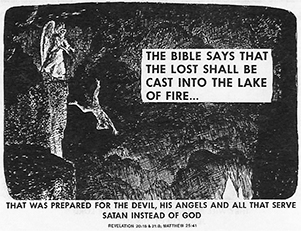 Whoopsie-daisy! from tract number 7 Creator or Liar?
Whoopsie-daisy! from tract number 7 Creator or Liar?Named for the depictions that exist within tracts of the Angels carrying out God’s judgement on non-believers into the pits of Hell. The angels themselves are often shown with outstretched arms, having recently dropped a person towards the pits of Hell. Chick uses this as the common fate for those who did not accept Jesus Christ.
 Suffering Christ ⇑ ⇓
Suffering Christ ⇑ ⇓ 
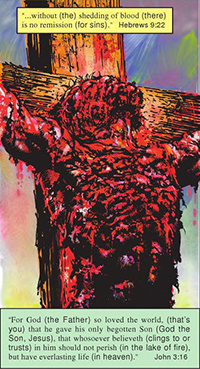 The Son of God lovingly rendered as approximately 165 pounds of ground chuck in Comic number 8, The Gift
The Son of God lovingly rendered as approximately 165 pounds of ground chuck in Comic number 8, The GiftA pictorial depiction of Christ suffering on the crucifixion, attempting to convey the point that Jesus died for your sins, and that you can repay this kindness by acceptance of Chick’s beliefs. Often times, the image is a victim of artistic licence, favouring the power of the image over other depictions of the crucifixion. While not as gore-heavy as The Passion of the Christ and limited due to the small size of the tracts, the intention of guilting readers is nevertheless prevalent.
 Talking Windows ⇑ ⇓
Talking Windows ⇑ ⇓ 
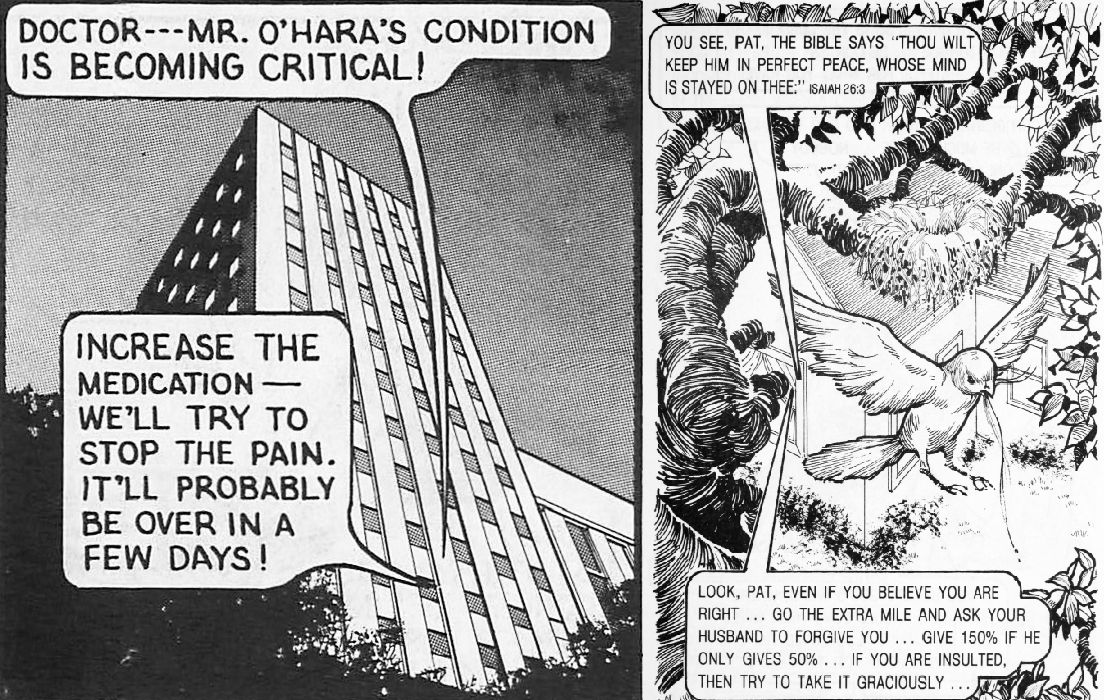 A hospital laments Danny O'Hara's imminent death in tract number 33, Room 310, left, and the Miller's house explains to Pat how to let her lazy husband walk all over her in Comic number 11, The Marriage Mess, right.
A hospital laments Danny O'Hara's imminent death in tract number 33, Room 310, left, and the Miller's house explains to Pat how to let her lazy husband walk all over her in Comic number 11, The Marriage Mess, right.Generally an issue with art direction and consistency, the framing and scene in the narrative results in speech bubbles not lining up with characters, and occasionally pointing to objects instead of people. This has the effect of making buildings and windows appear to be talking, as opposed to the characters established by the narrative.
 Title Drop ⇑ ⇓
Title Drop ⇑ ⇓ 
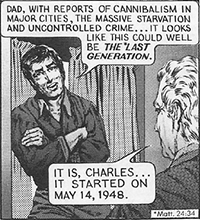 Charles thinks that recent reports of cannibalism herald the titular "Last Generation" in tract #031.
Charles thinks that recent reports of cannibalism herald the titular "Last Generation" in tract #031.Charles thinks that recent reports of cannibalism herald the titular "Last Generation" in tract #031.
A trope in which the dialogue of the characters of the narrative will include the title of the media showing the story. For the case of Chick Tracts, this trope is often used to make the reader focus on a specific conversation occurring in-universe, under the pretext of importance. This is also often used in combination with the Emphatic Formatting trope, to draw even more attention to a specific section of dialogue being spoken by the characters of the narrative.
 Tract-ception ⇑ ⇓
Tract-ception ⇑ ⇓ 
-- See Tract-ception page
 What's a Jesus? ⇑ ⇓
What's a Jesus? ⇑ ⇓ 
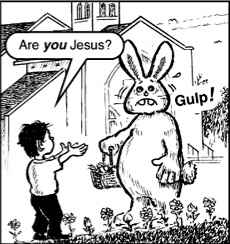 Isn't this what what we're all asking ourselves? (Tract #198, Fairy Tales?)
Isn't this what what we're all asking ourselves? (Tract #198, Fairy Tales?)
In accordance with The Great Commission, it is supposedly the duty of every Bible believer to deliver the good news of the gospel to all of the nations and to give "reason of the hope that is in [them] with meekness and fear". However, this command, combined with the inherent insular nature of many conservative religious communities leads to the misunderstanding that non-believers and the adherents of faiths other than their's are completely unfamiliar with even the fundamental concepts of their dogma. Perhaps this stems from the mistaken supposition that anyone who knew the things that the believer "knows" would instantaneously recognize their truth and value and immediately adopt them for themselves. Maybe it is an inherent side effect of their assumption that all references to religion are strictly verboten in public schools. In any case, even the most basic concepts of who Jesus supposedly was or that he is purported to have died by crucifixion in substitutionary atonement for the sins of all the world are assumed to be completely unknown and foreign concepts to those outside their belief systems.
Needless to say, in most of the English speaking world, holidays such as Christmas and Easter are nearly universally recognized and celebrated by the pious and the secular alike, significant majorities of most industrialized nations identify as religious (or specifically as Christian), and in some communities churches outnumber schools many times over. Given this, it would be absurd to assume your average non-Christian wouldn't be at least passingly familiar with the basic foundations of Christianity via simple cultural osmosis.
Nonetheless, in the world found in most Chick literature, your average non-believer has never even heard the name of Jesus and is in no way familiar with the stories of his birth, life, ministry, execution, and ressurection. Likewise, the average Muslim is equally unfamiliar with Jesus despite him being a rather prominent figure in the Islamic religion as well. Most frequently, this plot contrivance serves primarily as a simplified (as well as hackneyed) method for the author to deliver exposition on these foundational topics to the reader by way of his thick-headed characters.
 "YAAAAAAA" ⇑ ⇓
"YAAAAAAA" ⇑ ⇓ 
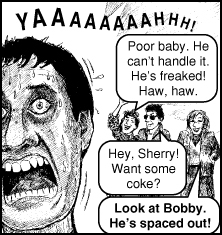 Bobby loses his cool, and exclaims the famous phrase after taking a hot dose in tract number 80, The Hunter.
Bobby loses his cool, and exclaims the famous phrase after taking a hot dose in tract number 80, The Hunter.An exclamation meant to replicate a primal scream of fear, often as the characters are experiencing what could be considered gruesome deaths, particularly due to the seeming expedited nature of ‘karma’ in the Chick-verse (see the HVKR trope). While there are variations to spelling for this, the net result is that characters will often have the same basic scream when dying in certain ways. This is also intended to draw attention to the death, akin to the common depiction of heart attacks in film and media; reality is rarely as dramatic.
 Further Reading ⇑
Further Reading ⇑ 
- "Chick Tracts" - User maintained catalog of tropes found in Chick's work.
(TV Tropes) - "Fang's a Lot!" - A partial list of Fang sightings.
(Jack Chick Museum of Fine Art) - "Tracts within Tracts" - A listing of some instances of tracts appearing inside of other tracts.
(Jack Chick Museum of Fine Art)
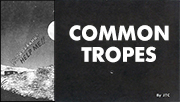

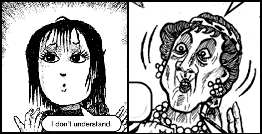 The unnamed protagonist of Best Friend (#130, left) and Gladys (#164, right) both suffer from the debilitating condition known as Navel Mouth.
The unnamed protagonist of Best Friend (#130, left) and Gladys (#164, right) both suffer from the debilitating condition known as Navel Mouth.